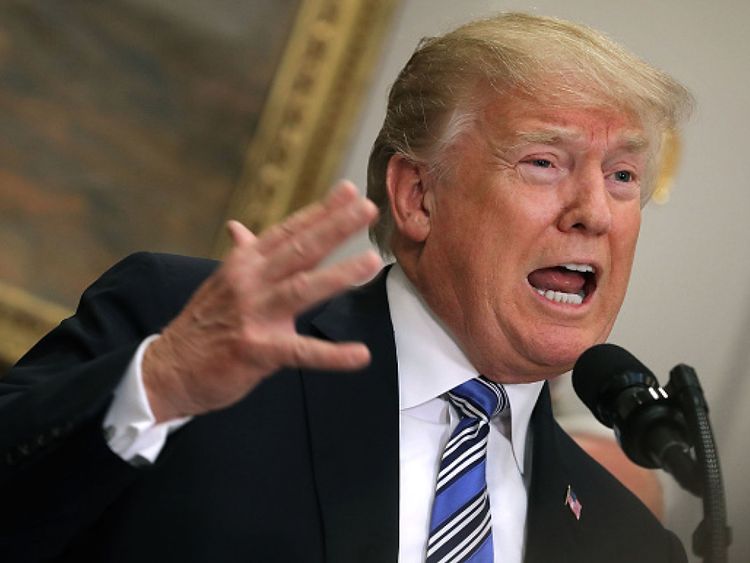Donald Trump has postponed metal tariffs on the UK at the eleventh hour to prevent a trade war.
The US President offered the 30-day reprieve to the EU, Mexico and Canada after Wall Street closed down on Monday over fears of a tit-for-tat spat.
A 25% tariff on steel and 10% duty on aluminium was due to come into effect at 5.01am BST on Tuesday after temporary exemptions granted in March expired.
The Trump administration is “extending negotiations with Canada, Mexico and the European Union for a final 30 days”, the White House said.
Mr Trump had told US trading partners they must make concessions after “decades of unfair trade and bad policy” but the EU has insisted it will not negotiate without first obtaining a permanent exemption.
The bloc has threatened to retaliate to any tariffs by placing duty on iconic American items such as Harley-Davidson motorbikes, jeans and bourbon whiskey.
A UK government spokeswoman said the postponement was “positive” but the UK steel and aluminium industries need safeguarding.
“We remain concerned about the impact of these tariffs on global trade and will continue to work with the EU on a multilateral solution to the global problem of overcapacity, as well as to manage the impact on domestic markets,” she added.
UK Steel Director Gareth Stace said: “This extension comes with a health warning. 30 days does not give us much time and all signs point towards a US insistence on the restriction of steel exports by its allies.
“We know ultimately that both tariffs and quotas would be negative for all parties.
“US steel consumers are already reporting price increases and supply chain disruption and with the UK steel sector emerging from recent difficulties, significant curtailments on exports will only hinder recovery.”
Last year the EU exported more than £5.6bn of steel and aluminium to the US, while Canada exported more than £8.7bn and Mexico £3bn.
The UK alone exports about £360m of high-value steel products into the US each year, equalling about 15% of all British exports.
When Mr Trump announced the tariffs at the beginning of March Richard Warren, head of policy at UK Steel, said the tariffs “smack of short-termism, protectionism and would be rife with unintended consequences for global trade and for the users of steel in the US”.
He said the tariffs would “seriously undermine our ability to compete” in the US market.
Extensions for Canada and Mexico had been expected as the three countries are currently renegotiating the North American Free Trade Agreement (NAFTA).
However, the EU was not expected to gain an extension, despite the union’s top trade official Cecilia Malmstrom lobbying US Commerce Secretary Wilbury Russ in last-ditch talks.
In a statement, the European Commission said: “The US decision prolongs market uncertainty, which is already affecting business decisions.
“The EU should be fully and permanently exempted from these measures, as they cannot be justified on the grounds of national security.
“The EU has also consistently indicated its willingness to discuss current market access issues of interest to both sides, but has also made clear that, as a longstanding partner and friend of the US, we will not negotiate under threat.”
The bloc’s three largest economies, Britain, Germany and France, held crisis talks over the tariffs on Sunday.
French officials afterwards said they had agreed “the EU must be ready to act” if Washington presses ahead with the tariffs.
Mr Trump met French President Emmanuel Macron and German Chancelor Angela Merkel last week, but gave no indication as to whether he was going to allow an exemption.
Germany warned last week it expected Washington to impose the tariffs from 1 May.
However, a key economic adviser to Mr Trump, the National Economic Council’s director, Larry Kudlow, hinted EU concessions in the car sector may be enough to gain an exemption.
At the beginning of April China imposed tariffs on a £2.1bn list of 128 US products in retaliation over Mr Trump imposing tariffs of up to £42.6bn on Chinese imports to the US.
Beijing imposed a 25% duty increase on frozen US pork and aluminum scrap, and 15% on sparkling wine, steel pipe used by oil and gas companies, and fruits and nuts including apples, walnuts and grapes.
South Korea has gained a permanent steel tariff exemption by agreeing to quotas that will cut its steel shipments by about 30% from 2017 levels, but it is still subject to US aluminium tariffs.
From – SkyNews






